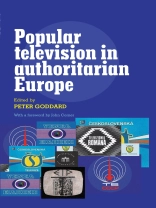This lively and ground-breaking collection brings together work on forms of popular television within the authoritarian regimes of Europe after World War Two. Ten chapters based on new and original research examine approaches to programming and individual programmes in Spain, Greece, Czechoslovakia, Romania, the USSR and the GDR at a time when they were governed as dictatorships or one-party states. Drawing on surviving archives, scripts and production records, contemporary publications, You Tube clips and interviews with producers and performers, its chapters recover examples of television programming history unknown beyond national borders and often preserved largely in the memories of the audiences who lived with them.
The introduction examines how television can be considered ‘popular’ in circumstances where audience appeal is often secondary to the need for state control. Published in English, Popular television in authoritarian Europe represents a significant intervention in transnational television studies, making these histories available to scholars for the first time, encouraging comparative enquiry and extending the reach – intellectually and geographically – of European television history.
There is a foreword by John Corner and an informative timeline of events in the history of television in the countries covered.
Table of Content
Foreword – John Corner
1. Introduction: Popular television in authoritarian Europe: A popular conundrum? – Peter Goddard
2. Football and bullfighting on television: spectacle and Spanish identity during Franco’s dictatorship (1956–75) – Juan Francisco Gutiérrez Lozano
3. From puppets to puppeteers: modernising Spain through entertainment television – Mar Binimelis, Josetxo Cerdán and Miguel Fernández Labayen
4. Entertaining the Colonels: propaganda, social change and entertainment in Greek television fiction (1967–74) – Gregory Paschalidis
5. Staying outside ‘The Egg’: surrealist entertainment during the Greek dictatorship – Christina Adamou
6. Between politics and soap: the articulation of ideology and melodrama in Czechoslovak communist television serials (1975–89) – Irena Carpentier Reifová, Petr Bednarík and Šimon Dominik
7. Re-staging the popular: televising Nicolae Ceausescu – Dana Mustata
8. KVN: live television and improvised comedy in the Soviet Union, 1957–71 – Andrew Janco
9. Undercover: how the East German political system presented itself in television series – Sascha Trültzsch and Reinhold Viehoff
10. Agitprop gone wrong: Der Schwarze Kanal – Frank Engelmann-del Mestre
11. Popular music on East German television: Constructing the televisual pop community in the GDR – Edward Larkey
12. A timeline of events in the history of television in authoritarian Europe – Berber Hagedoorn and Peter Goddard
Index
About the author
Peter Goddard is Senior Lecturer in the Department of Communication and Media at the University of Liverpool












